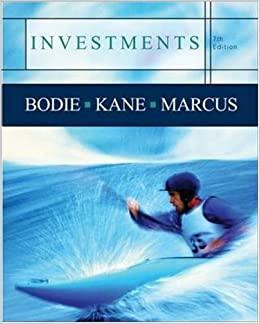Question
Please answer the following questions below. No Explanation is needed. 1. An asset has annual returns of 16, 10 , 3 ,-18 and 21 percent
Please answer the following questions below. No Explanation is needed.
1. An asset has annual returns of 16, 10 , 3 ,-18 and 21 percent respectively for the last five years-what is the standard deviation of these returns ?
a. 14.68%
b. 15.03%
c. 14.14%
d. 13.60%
e. 15.21%
2. Hill's Country Fresh Eggs is a relatively young firm which just paid their first annual dividend of $.40 a share. Management projects dividend increases of 15 percent per year for five years followed by a constant growth rate of 3 percent annually. What is this stock worth today if the applicable discount rate is 11 percent?
a. $8.37
b. $9.42
c. $12.45
d. $9.08
e. $11.76
3. what is the expected return on this stock given information ?
State of economy is boom Probability of state of economy is .10 and Rate of return if state occurs 16%
State of economy is Normal Probability of state of economy is .65 and Rate of return if state occurs 8%
State of economy is Recession Probability of state of economy is .25 and Rate of return if state occurs -9%
a. 4.55%
b. 8.45%
c. 6.75%
d. 5.00 %
e 9.05%
4. Stock X has a standard deviation of 40 percent per year and stock Y has a standard deviation of 12 percent per year.. The correlation between stock A and stock B is .22. You have a portfolio of these two stocks where in stock X has a portfolio weight of 55 percent. What is your portfolio standard deviation?
a. 22.47 %
b. 23.78%
c. 23.92%
d. 23.33%
e. 23.84%
5. Which of the following is true ?
a. Return is inversely related to risk
b. The primary risk consideration is that of the individual security
c. How a security affects the risk of a portfolio is more important than the actual risk of the security itself
d. investing has three dimensions: risk, return and surprise
e. Investors are compensated for both systematic and unsystematic risk
6. What is the beta of a portfolio which consists of the following ?
Security A - Amount invested $7000 Beta 1.14
Security B - Amount invested $3000 Beta 0.62
Security C - Amount invested $5000 Beta 1.37
Security D - Amount invested $9000 Beta 0.88
a. 1.07
b. 1.17
c. 1.03
d. 0.99
e. 1.14
7. The spot price for one share of ADO stock is $48. The risk-free rate is 4.5 percent and the market rate is 11.5 percent. What is the 3-month futures price of ADO stock if spot-futures parity exists?
a. $47.47
b. $45.93
c. $48.53
d. $50.16
e. $47.98
8. A put option grants its holder the ______ a security at the strike price within the option period.
a. Obligation to buy
b. Obligation to sell
c. right, but not the obligation to buy
d. right, but not the obligation to sell
e. obligation to lend
9. A call option gives its owner the______________ a security at the strike price within the option period.
a. right to borrow
b. right , but not the obligation to buy
c. right but not the obligation to sell
d. obligation to buy
e. obligation to sell
10. The party which is obliged to buy shares when an option is exercised is called the:
a. put owner
b. call owner
c. put holder
d. put writer
e. call maker
Step by Step Solution
There are 3 Steps involved in it
Step: 1

Get Instant Access to Expert-Tailored Solutions
See step-by-step solutions with expert insights and AI powered tools for academic success
Step: 2

Step: 3

Ace Your Homework with AI
Get the answers you need in no time with our AI-driven, step-by-step assistance
Get Started


